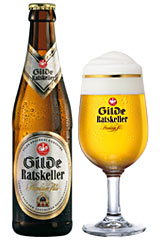InBev to reconsider a piecemeal sale
Gilde in Hannover has always been a regional brand whose fortunes have declined in sync with German beer consumption and InBev’s disdain for the lacklustre brand. At the end of the 1990s, Gilde sold more than 1 million hl. Today the volume of its namesake brand has declined to an estimated 250,000 hl. Unfortunately, the brewery has a capacity of a 1.8 million hl. Which means that it would have been heavily underutilised for years – had not InBev used the extra capacity to brew its other German brand Beck’s there plus 1.2 million hl of a white brand for the German discount supermarket chain Lidl.
This contract has come to an end and InBev announced that it would make 90 of its 130 employees in Hannover redundant.
That decision, made public in early February, raised a storm as Interbrew originally had given a guarantee that it would keep Gilde’s legal situs in Hannover for 30 years so that the city council would continue to receive Gilde’s local business tax. Moreover, Interbrew had agreed to keep the brewery running for another 15 years and promote the Gilde brand for another 5 years.
However, the sales contract does not stipulate how much beer Interbrew (now InBev) has to brew in Hannover or how many people it has to employ.
If the worst comes to the worst, InBev could hang on to the Hannover brewery – even if only just – and close its doors forever in 2017. To maintain Gilde’s guaranteed legal situs, a letter box in Hannover would actually do.
A competitor to have signalled an interest in buying the Gilde brewery – albeit for a symbolic price – is the Einbecker brewery from Einbeck, a town close by. Einbecker in 2007 had a turnover of EUR 42 million and brewed 800,000 hl beer. Those figures make it hard to see how Einbecker could finance a multi-million euro deal.
Nevertheless, showing interest in rescuing the Gilde brewery has raised Einbecker’s profile among Hannover’s beer drinkers in no small way, while the whole affair has fortified InBev’s reputation as a cold-blooded, money-obsessed brewing behemoth.
Perhaps history will repeat itself and some of Gilde’s managers will break into their piggy-banks and organise a buy-out the way their ex-colleagues did at Wolters’.
Apart from Gilde, InBev Germany has breweries in Bremen (Beck’s), Munich (Spaten-Franziskaner-Löwenbräu), Wernigerode (Hasseröder) and Issum (Diebels).
The Wolters brewery in Braunschweig (800,000 hl), which was part of the original Gilde deal, InBev managed to off-load to four of its former managers in May 2006 for about EUR 8 million – after InBev had declared the brewery unprofitable and about to be closed with the immediate loss of more than 100 jobs.
InBev’s announcement, issued just before Christmas 2005, did the trick. A grass-roots campaign to “Save Wolters” was formed and proved successful.


